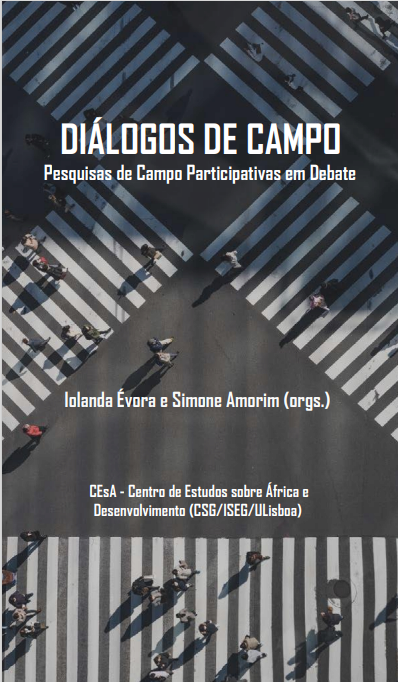Diálogos de Campo – Pesquisas de Campo Participativas em Debate

Title: Diálogos de Campo - Pesquisas de Campo Participativas em Debate
Author(s): Iolanda Évora e Simone Amorim
Publication Date: Nov-2023
Publisher: ISEG/CEsA - Centro de Estudos sobre África e Desenvolvimento
Quotation: Évora, I. e Amorim, S. (2023). “Diálogos de Campo - Pesquisas de Campo Participativas em Debate”. Lisboa, CEsA/CSG. ISBN 978-989-54687-4-4
Abstract: This volume brings together concerns that serve as the basis for a continued debate on the mutual implications of research in the field of Social Sciences. The texts start from the common observation about the weakening of demands about “how we do it” in social research and deal with aspects related to fieldwork that are increasingly losing space in academia, essentially focused on producing results. From the fields of Social Sciences, Cinema, Literature, and Psychology, among others, the themes move between the dimensions of power hierarchies in research and the contexts that exponentiate them; the position and positionality of the researcher, and where we are placed by our interlocutors or people in the situations addressed. Specifically, they reflect on participatory methodologies and changes in knowledge production; ethnography and epistemic decolonization when the researcher does research in their life context; the interferences and determinations dictated by the field, during research; collaborative or participatory research, whether with refugee associations, in the field of artistic training or action research on bicycles and the city. Furthermore, the researcher's subjectivity and writing regarding anti-racist cinema are addressed; as the implications of the researchers themselves in researching topics such as the impact of the pandemic on women, cultural heritage, or an object present, simultaneously, on different continents. The classic questions of the debate on methodology are present, which are, in fact, the foundations of current affairs, bringing different nuances of the contemporary debate, in social research, at a time when easier access to information reduces the distance and access of society (and the subjects of social research) to the knowledge about themselves produced in academia. This book was designed within the scope of the methodology workshops of the Afro-Port project (FCT/CEsA) and coincides with the project's objective of contributing to a program in horizontal methodology and grounded methodology that is original, innovative and transdisciplinary, sustained by the interest in dialogue between academic and non-academic/scientific and non-scientific discourse.
Identifier: 978-989-54687-4-4
Category: E-Book
Abstract:
This volume brings together concerns that serve as the basis for a continued debate on the mutual implications of research in the field of Social Sciences. The texts start from the common observation about the weakening of demands about “how we do it” in social research and deal with aspects related to fieldwork that are increasingly losing space in academia, essentially focused on producing results. From the fields of Social Sciences, Cinema, Literature, and Psychology, among others, the themes move between the dimensions of power hierarchies in research and the contexts that exponentiate them; the position and positionality of the researcher, and where we are placed by our interlocutors or people in the situations addressed. Specifically, they reflect on participatory methodologies and changes in knowledge production; ethnography and epistemic decolonization when the researcher does research in their life context; the interferences and determinations dictated by the field, during research; collaborative or participatory research, whether with refugee associations, in the field of artistic training or action research on bicycles and the city. Furthermore, the researcher’s subjectivity and writing regarding anti-racist cinema are addressed; as the implications of the researchers themselves in researching topics such as the impact of the pandemic on women, cultural heritage, or an object present, simultaneously, on different continents. The classic questions of the debate on methodology are present, which are, in fact, the foundations of current affairs, bringing different nuances of the contemporary debate, in social research, at a time when easier access to information reduces the distance and access of society (and the subjects of social research) to the knowledge about themselves produced in academia. This book was designed within the scope of the methodology workshops of the Afro-Port project (FCT/CEsA) and coincides with the project’s objective of contributing to a program in horizontal methodology and grounded methodology that is original, innovative and transdisciplinary, sustained by the interest in dialogue between academic and non-academic/scientific and non-scientific discourse.
Quotation:
Évora, I. e Amorim, S. (2023). “Diálogos de Campo – Pesquisas de Campo Participativas em Debate”. Lisboa, CEsA/CSG. ISBN 978-989-54687-4-4





